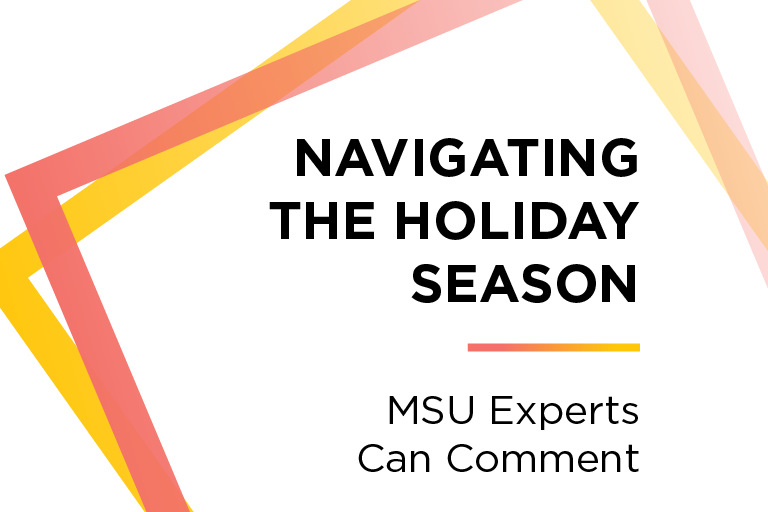Excerpt from an article on MSUToday.
The fall and winter seasons are a time when many Americans celebrate holidays and spend time with family and away from work. However, there can be many stressors that come along with preparing for these holidays, especially as people shop for gifts, cook large meals for gatherings and spend time with family members they may not see often.
Michigan State University experts are available to comment on many aspects of navigating the holiday season — from economics to cybersecurity and counterfeit goods to relationships and health.
Counterfeit goods and cybersecurity
Saleem Alhabash ;is a professor in the Department of Advertising and Public Relations at MSU’s College of Communication Arts and Sciences. He is an expert on the persuasive impacts of digital and social media across many contexts, such as online safety and anti-counterfeiting. Alhabash is the associate director of research for MSU’s Center for Anti-Counterfeiting and Product Protection.
“The global prevalence of counterfeit products is at an all-time high. The proliferation of e-commerce and online shopping platforms has facilitated the increase in the availability of counterfeit products. Recent data estimate that the counterfeit market rose to $3 trillion globally in 2022, thus suggesting sharp losses for brands. As consumers are heading to stores, including e-retail shops, to get a good deal for holiday shopping, it is important to be aware of the risks associated with buying counterfeit products, specifically online.”
Relationships and health
Elizabeth Dorrance Hall is an associate professor in the Department of Communication ;at MSU’s College of Communication Arts and Sciences and she manages MSU’s Family Communication and Relationships Lab. She is an expert in family communication processes and other close relationships and understanding the evolution of these relationships.
“Communicating across difference is challenging, but the holidays do not have to be uncomfortable. Focus on what you do have in common with your family members. Similarity is the foundation of most relationships. Because family relationships are “built in” instead of started from scratch, we often take for granted what we have in common. Plan activities around shared interests and be sure to catch up with your cousin who has similar tastes in TV or books. If you don’t have much in common, be curious and take an interest in their lives. What does their day-to-day look like at work? Ask questions and really listen to their answers.
“Practice active listening, even if you disagree. We are all familiar with how bad it feels to not really be listened to. Active listening includes making eye contact, turning your body toward the person you are speaking with and nodding along. Beyond these nonverbal behaviors, active listening includes really tuning in to what the person is sharing instead of thinking ahead to how you want to respond. It also includes repeating back what they are saying to check you understand the point they are trying to make and encouraging them to explain more or go on. Perspective-taking goes a long way in not only understanding why your family members say the things they say but also in increasing empathy for their point of view. Try to dig under the surface of their beliefs to understand where their beliefs come from. Importantly, the goal here is to better understand, not to change their minds. If only listening to argue against them or change their minds, the quality of the conversation will suffer.”
